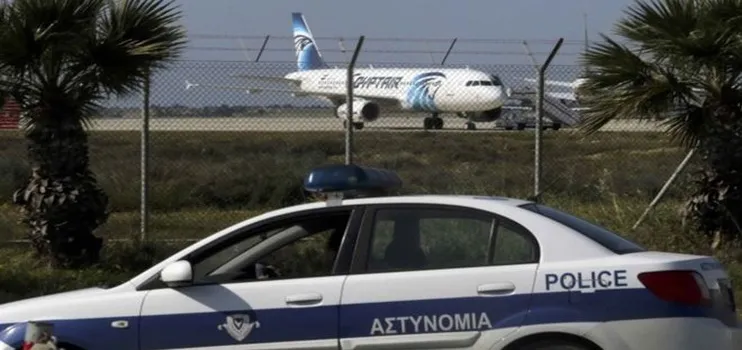
Egyptair flight hijacked
Mar 28, 2016

In March 2016, EgyptAir Flight MS181 was hijacked during a domestic flight from Alexandria to Cairo. The aircraft, an Airbus A320, was commandeered by an individual claiming to have a suicide belt. The hijacker redirected the plane to Cyprus, demanding the release of prisoners. After several hours of negotiations, the situation was resolved without any casualties among the passengers or crew. The hijacker was apprehended, and the incident highlighted security vulnerabilities in aviation and led to increased scrutiny of airport security protocols in Egypt and beyond. The event also raised concerns about terrorism and political motivations behind such acts.
Overview of the EgyptAir Flight Hijacking Incident
The EgyptAir flight hijacking incident left a significant mark on aviation security and international relations. On March 29, 2016, an EgyptAir flight en route from Alexandria to Cairo was hijacked by a man claiming to be armed with explosives. This incident heightened concerns about air travel safety and prompted immediate responses from various agencies. Understanding the specifics of this event is crucial for all stakeholders in the aviation industry.
Timeline of Events
Below is a detailed timeline of the events that unfolded during the EgyptAir flight hijacking:
| Time | Event |
|---|---|
| 8:00 AM | Flight MS181 departs from Alexandria. |
| 8:30 AM | Flight is hijacked by Seif Eldin Mustafa. |
| 8:45 AM | Hijacker demands to speak with his estranged wife. |
| 9:00 AM | Flight diverts to Larnaca, Cyprus. |
| 10:00 AM | Passengers released, negotiations begin. |
| 12:00 PM | Hijacker surrenders to authorities. |
Key Players Involved
The successful resolution of the EgyptAir flight hijacking involved multiple parties, each playing a critical role in ensuring the safety of the passengers and crew. The key players included:
- EgyptAir: The airline's management coordinated with authorities to manage the crisis.
- Cyprus Authorities: Local law enforcement and military were involved in securing the area and negotiating with the hijacker.
- International Agencies: Various international agencies monitored the situation, providing support and expertise.
Impact on Aviation Security
The hijacking of EgyptAir flight MS181 had profound implications for aviation security worldwide. The incident prompted a reevaluation of existing safety protocols and measures. Key impacts included:
- Increased Security Checks: Airports worldwide implemented more rigorous screening processes for passengers and baggage.
- Training for Crew Members: Flight crews received enhanced training on handling hijacking situations and managing passenger safety.
- Collaboration Among Nations: There was a renewed focus on international cooperation to prevent similar incidents.
Lessons Learned from the Incident
The EgyptAir flight hijacking serves as a case study for aviation experts and security professionals. Some critical lessons learned include:
- Importance of Communication: Clear and effective communication between airlines, authorities, and passengers is vital during a crisis.
- Preparedness: Being prepared for unexpected situations can save lives and reduce panic.
- Public Awareness: Educating the public about potential threats can enhance overall security.
Conclusion
The hijacking of the EgyptAir flight was a pivotal moment in aviation history, highlighting the vulnerabilities within air travel. The incident not only tested the resilience of the airline and law enforcement but also underscored the importance of ongoing vigilance in aviation security. Moving forward, the lessons learned from this event will continue to shape policies and practices in the industry.
Related Keywords for SEO
When discussing the EgyptAir flight hijacking, it is essential to incorporate relevant keywords to enhance visibility in search engines. Some of the keywords include:
- EgyptAir flight hijacking
- aviation security
- flight safety
- air travel safety
- Crisis management in aviation
Incorporating these keywords strategically throughout content can improve search engine rankings and attract a broader audience interested in aviation security topics.
Related Articles

Explore Thailand: The Best Islands to Visit for Paradise, Adventure, and Relaxation

The Ultimate Guide to the Best Islands in Thailand for Your Next Getaway

Do babies need passports? How to get a passport for a newborn

How to get a U.S. passport fast: here’s how to expedite the process

What is Mobile Passport Control: 5 reasons why you should use it

SENTRI vs. Global Entry: A detailed guide

Do you need a passport to go to the Bahamas? Let’s find out

Do you need a passport to go to Mexico? A detailed guide

Do you need a passport to go to Canada? We got the answer

Do You Need a Passport for a Cruise: An Essential Travel Guide

Booster Seat Requirements: All the Rules to Follow in Your Rental Car

What Are the World’s Most Powerful Passports, and How Does Yours Rank?

How to Take a Passport Photo at Home: A Helpful Guide

You've got to have heart! Southwest's new livery

Your opinion: Should water be free on low cost carriers?

Young women bolder than guys as solo travellers
